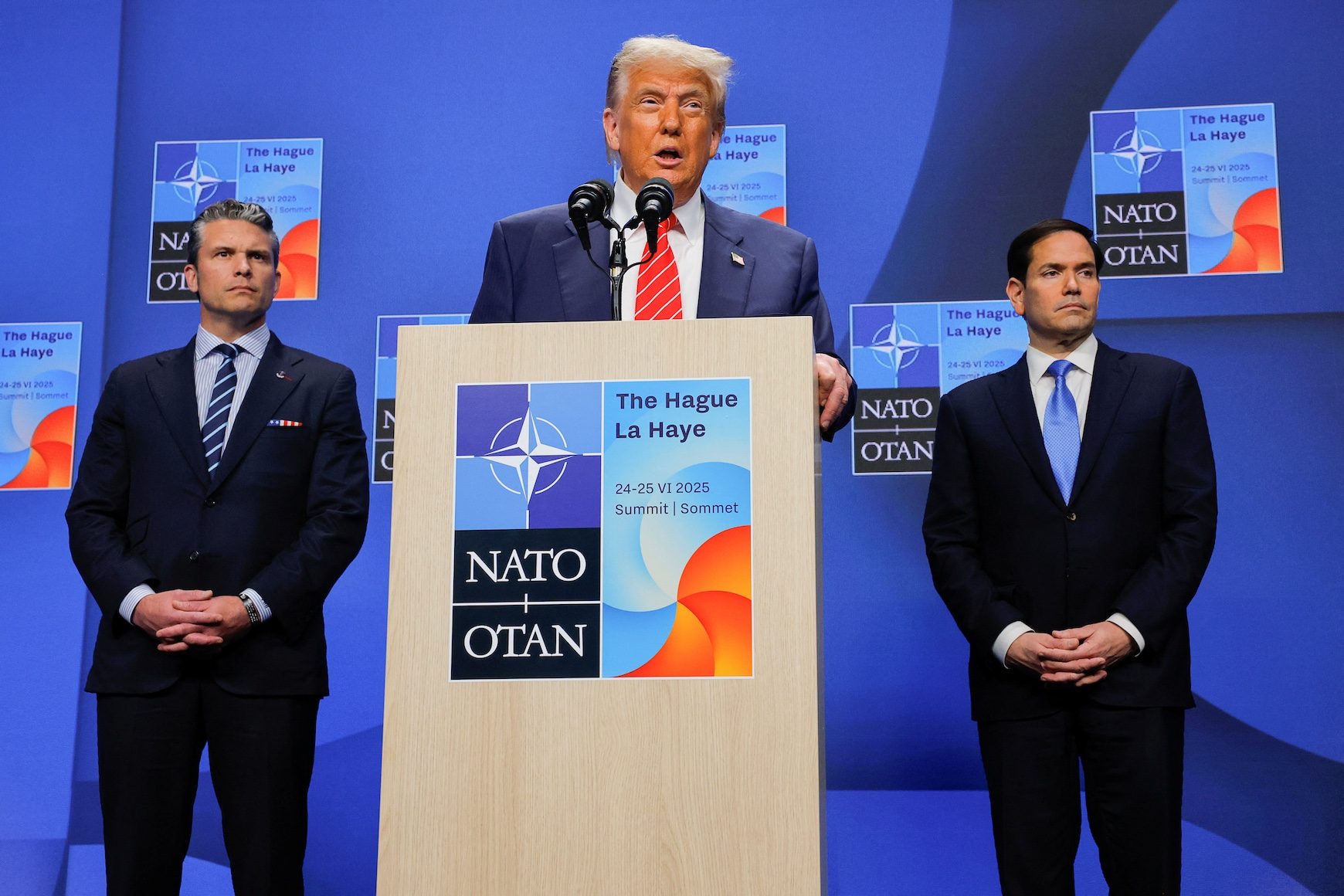Physical Address
304 North Cardinal St.
Dorchester Center, MA 02124
Physical Address
304 North Cardinal St.
Dorchester Center, MA 02124

US President Donald Trump revelled in the swift end to war between Iran and Israel, saying he now expected a relationship with Tehran that would preclude rebuilding its nuclear program despite uncertainty over damage inflicted by US strikes.
As exhausted and anxious Iranians and Israelis both sought to resume normal life after the most intense confrontation ever between the two foes, Iran’s president suggested that the war could lead to reforms at home.
Trump, speaking in The Hague where he attended a NATO summit on Wednesday, said his decision to join Israel’s attacks by targeting Iranian nuclear sites with huge bunker-busting bombs had ended the war, calling it “a victory for everybody”.
He shrugged off an initial assessment by the US Defense Intelligence Agency that Iran’s path to building a nuclear weapon may have been set back only by months, saying the findings were “inconclusive” and he believed the sites had been destroyed.
“It was very severe. It was obliteration,” he said.
Israel’s Prime Minister’s office released an assessment by Israel’s own nuclear agency that the strikes had “set back Iran’s ability to develop nuclear weapons by many years”. The White House also circulated the Israeli assessment.
Trump said he was confident Tehran would not try to rebuild its nuclear sites and would instead pursue a diplomatic path towards reconciliation.
“I’ll tell you, the last thing they want to do is enrich anything right now. They want to recover,” he said.
If Iran tried to rebuild its nuclear program, “We won’t let that happen. Number one, militarily we won’t,” he said, adding that he thought “we’ll end up having something of a relationship with Iran” to resolve the issue.
The head of the UN’s nuclear watchdog, Rafael Grossi, dismissed what he called the “hourglass approach” of assessing damage to Iran’s nuclear program in terms of months needed to rebuild as besides the point for an issue that needed a long-term solution.
“In any case, the technological knowledge is there and the industrial capacity is there. That, no one can deny. So we need to work together with them,” he said. His priority was returning international inspectors to Iranian nuclear sites, which he said was the only way to find out precisely what state they were in.
Iran has always denied seeking an atomic weapon, which Western countries have accused it of pursuing for decades.
Israel’s bombing campaign, launched with a surprise attack on June 13, wiped out the top echelon of Iran’s military leadership and killed its leading nuclear scientists. Iran responded with missiles that pierced Israel’s defences in large numbers for the first time.
Iranian authorities said 610 people were killed and nearly 5,000 injured in Iran, where the extent of the damage could not be independently confirmed because of tight restrictions on media. Twenty-eight people were killed in Israel.
Both Iran and Israel declared victory: Israel claiming to have achieved its goals of destroying Iran’s nuclear sites and missiles, and Iran claiming to have forced the end of the war by penetrating Israeli defenses with its retaliation.
But Israel’s demonstration that it could target Iran’s senior leadership seemingly at will poses perhaps the biggest challenge ever for Iran’s clerical rulers, at a critical juncture when they must find a successor for Supreme Leader Ali Khamenei, now 86 and in power for 36 years.
President Masoud Pezeshkian, a relative moderate elected last year in a challenge to years of dominance by hardliners, said the atmosphere of national solidarity during the Israeli attacks would spur domestic reform.
“This war and the empathy that it fostered between the people and officials is an opportunity to change the outlook of management and the behavior of officials so that they can create unity,” he said in a statement carried by state media.
Still, Iran’s authorities moved swiftly to demonstrate their control. The judiciary announced the execution of three men on Wednesday convicted of collaborating with Israel’s Mossad spy agency and smuggling equipment used in an assassination. Iran had arrested 700 people accused of ties with Israel during the conflict, the state-affiliated Nournews reported.
During the war, both Netanyahu and Trump publicly suggested that it could end with the toppling of Iran’s entire system of clerical rule, established in its 1979 revolution.
But after the ceasefire, Trump said he did not want to see “regime change” in Iran, which he said would bring chaos at a time when he wanted the situation to settle down.
In both Iran and Israel, residents expressed relief at the end of the fighting, but also apprehension over the future.
“We came back after the ceasefire was announced. People are relieved that the war has stopped, but there’s a lot of uncertainty about what comes next,” said Farah, 67, who returned to Tehran from Lavasan near the capital where she had fled to escape Israeli bombing.
Her grandchildren were worried that the authorities would respond by imposing more severe enforcement of dress codes and other restrictions on social freedoms, she said by phone: “The world will move on and forget about the war — but we’re the ones who will live with its consequences.”
In Tel Aviv, Rony Hoter-Ishay Meyer, 38, said the war’s end brought mixed emotions – relief that children could return to school and normal life resume, but exhaustion from the stress.
“Those past two weeks were catastrophic in Israel and we are very much exhausted and we need to get back to our normal energy.” – Rappler.com